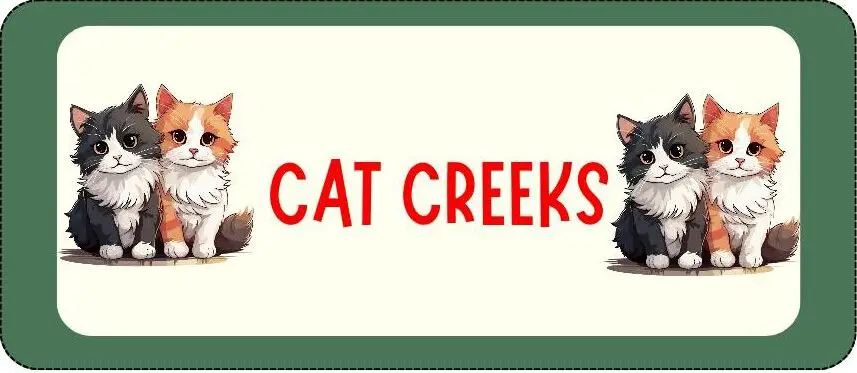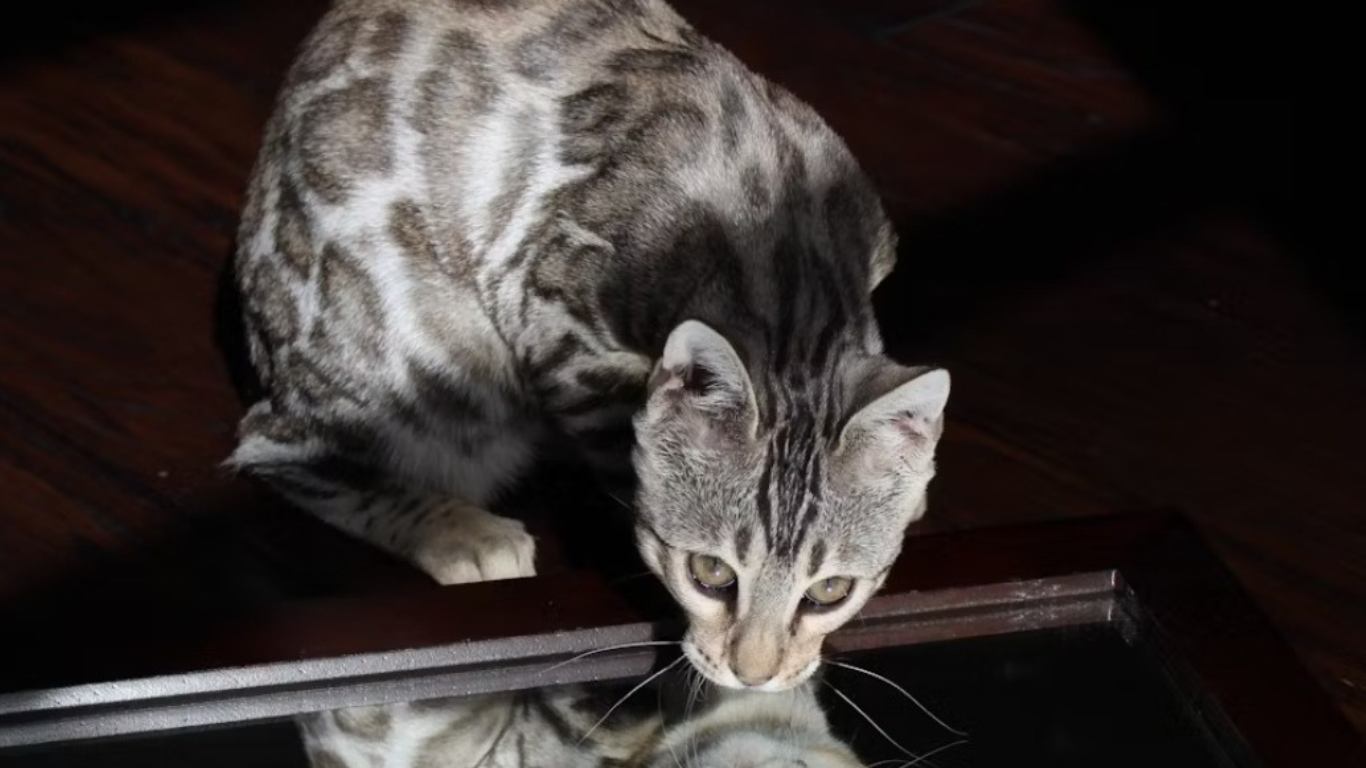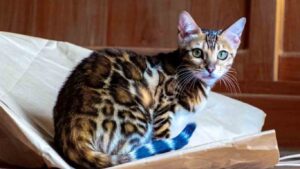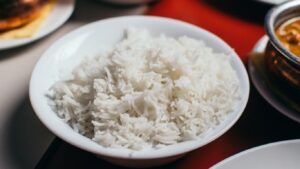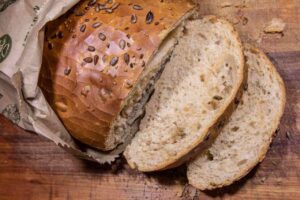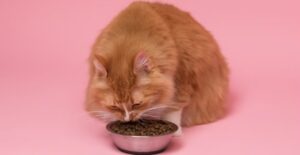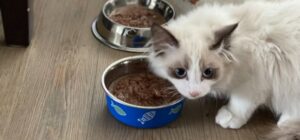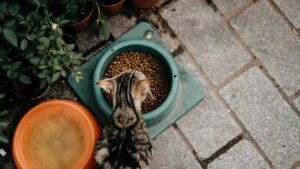Curious about why your Bengal cat is chowing down like there’s no tomorrow? Am here to tell you about it!
Let’s dive into the fascinating world of Bengal cats’ insatiable appetites and explore the reasons behind their never-ending hunger.
From their active and playful nature to their wild ancestry, we’ll uncover the secrets behind their voracious eating habits.
Get ready to embark on a journey that will leave you amazed and hungry for more information!
Why Does My Bengal Cat Eat So Much
Your Bengal cat eat so much because of their high energy levels and active lifestyles, which can lead to an increased appetite and also excessive physical activities the may be carrying out daily.
Keep in mind that Bengal cats have a natural instinct to hunt and explore, which requires fuel in the form of food, this also drives them to eat much.
Additionally, most Bengal cats have a faster metabolism than other breeds, causing them to eat more to meet their energy needs.
That being said, let’s break down the possible reasons why your Bengal cat might be eating so much.
Here are some potential reasons why your Bengal cat is eating so much:
1. Their High Energy Levels: Bengal cats are known for their high energy levels. These cats are active, playful, and require a lot of mental and physical stimulation.
And just like humans, when cats engage in vigorous activities, they burn calories and require additional energy to sustain their active lifestyle.
Therefore, if a Bengal cat is constantly on the move, exploring, playing, and climbing, it is natural for them to have an increased appetite to compensate for the energy they are expending.
To meet their energy demands, ensure that you provide your Bengal cat with enough opportunities for exercise and play.
Interactive toys, puzzle feeders, and scratching posts can help keep them mentally and physically stimulated.
By providing outlets for their energy, you can help satisfy their natural instincts and potentially regulate their appetite.
2. Their Fast Metabolism: Bengal cats have a relatively fast metabolism compared to some other cat breeds. Their bodies efficiently process and convert food into energy.
As a result, they may require more frequent meals and larger portions to maintain their energy levels and keep their metabolism running smoothly.
If you notice your Bengal cat eating more than usual, it could be because their fast metabolism is processing food quickly, leading to more frequent hunger cues.
It’s essential to provide them with a well-balanced and nutritious diet that meets their dietary requirements.
Consult with your veterinarian to determine the appropriate portion sizes and feeding schedule for your Bengal cat based on their age, weight, and activity level.
3. Their Growing Stages: During their growing stages, Bengal kittens experience rapid growth and development.
Just like human babies, they require more nutrients and calories to support their growth. It is common for growing Bengal kittens to have a healthy appetite and eat more frequently.
To ensure their proper growth and development, provide your Bengal kitten with a high-quality, kitten-specific cat food that is rich in essential nutrients.
Follow the feeding guidelines provided by the manufacturer or consult your veterinarian for personalized recommendations.
As your Bengal kitten matures and reaches adulthood, their appetite may naturally stabilize.
4. Lack of Portion Control: Bengal cats are known for their hearty appetites, and if portion control is not properly implemented, they can easily overeat.
These cats have high metabolisms and require a balanced diet to maintain a healthy weight.
If they are provided with unlimited access to food or are consistently given larger portions than necessary, they may consume more than their body requires, leading to excessive eating habits.
To address this issue, it’s important to establish a feeding schedule and measure out the appropriate portion sizes for your Bengal cat.
Consult with your veterinarian to determine the ideal amount of food based on your cat’s age, weight, and activity level.
Dividing their daily food into smaller meals throughout the day can also help regulate their eating habits and prevent overconsumption.
5. Excessive Physical Activities: Bengal cats are highly energetic and naturally inclined toward physical activities.
They have a playful nature and require mental and physical stimulation to prevent boredom.
If they don’t receive enough exercise or enrichment, they may resort to eating as a way to alleviate their restlessness.
Engaging in excessive physical activities may increase their appetite, leading to constant food consumption.
To address this issue, provide your Bengal cat with ample opportunities for exercise and play.
Interactive toys, climbing structures, and puzzle feeders can help keep them physically and mentally engaged.
Regular play sessions and interactive playtime with you can also help burn off their excess energy.
By ensuring they receive sufficient physical activities, their appetite may become more regulated.
6. Underlying Health Issues: Sometimes, increased food consumption in Bengal cats can be attributed to underlying health issues.
Certain medical conditions, such as hyperthyroidism, diabetes, or gastrointestinal problems, can lead to excessive hunger and weight gain.
If your Bengal cat’s eating habits have suddenly changed, it’s crucial to consult a veterinarian for a thorough examination.
The vet will conduct tests to rule out any underlying health issues.
Bloodwork, urinalysis, and other diagnostic procedures may be employed to identify the cause of increased appetite.
If a medical condition is detected, appropriate treatment and dietary adjustments can be recommended to manage the condition and regulate your cat’s eating habits.
Monitoring and Regulating Bengal Cat’s Food Intake
Managing a Bengal cat’s diet is crucial for their overall health and well-being. Providing them with high-quality nutrition is the first step towards ensuring they thrive.
When it comes to Bengal cats, their diet should consist of a balance of proteins, fats, and carbohydrates to meet their specific nutritional needs.
To manage a Bengal cat’s diet, here are some crucial things to keep in mind:
- High-quality nutrition: Opting for high-quality cat food is essential. Look for brands that use real meat as the primary ingredient, as this provides the necessary protein Bengal cats require. Avoid foods with fillers, artificial additives, or excessive grains, as these can lead to digestive issues or allergies. Reading the labels and understanding the ingredients list is vital in making the right choice for your Bengal cat’s nutrition.
- Portion control: While it’s tempting to fill your Bengal cat’s bowl to the brim, portion control is important to prevent obesity. Bengal cats are known for their muscular build, and maintaining a healthy weight is crucial for their joint health and overall mobility. Consult with your veterinarian to determine the appropriate portion size for your Bengal cat based on their age, weight, and activity level. It’s important to stick to the recommended portion size and avoid overfeeding.
- Scheduled Feeding: Instead of free-feeding, establish a feeding schedule for your Bengal cat. Divide their recommended daily portion into multiple small meals throughout the day. This helps prevent overeating and maintains a consistent food routine.
- Interactive feeding methods: Bengal cats are intelligent and active creatures that enjoy mental stimulation. Incorporating interactive feeding methods can help keep them engaged and prevent boredom. Consider using puzzle feeders or food-dispensing toys that require your Bengal cat to work for their meals. This not only provides mental stimulation but also slows down their eating pace, reducing the risk of digestive issues. It’s important to supervise your cat during these interactive feeding sessions to ensure they don’t become frustrated or overwhelmed.
- Environmental Enrichment: Engaging your Bengal cat in physical and mental activities can help prevent overeating. Provide them with interactive toys, scratching posts, and puzzle feeders to keep them mentally stimulated and physically active. This helps prevent boredom, which can lead to overeating.
- Regular Weigh-Ins: Keep track of your Bengal cat’s weight by scheduling regular weigh-ins. This helps you monitor any fluctuations and adjust their food intake accordingly. Any sudden weight gain or loss should be discussed with your veterinarian to rule out underlying health issues.
- Monitor Treats Intake: Treats are an excellent way to reward your Bengal cat, but too many can lead to excessive weight gain. Choose healthy, low-calorie treats and limit their intake. Remember, treats should only make up a small portion of their daily calorie intake.
- Avoid Table Scraps: While it may be tempting to share your own food with your Bengal cat, it’s important to avoid feeding them table scraps. Human food can be high in calories, unhealthy fats, and spices that may upset their delicate digestive system. Stick to cat-approved treats instead.
- Consulting a veterinarian: When it comes to managing a Bengal cat’s diet, it’s always a good idea to consult with a veterinarian. They can assess your cat’s specific needs and provide you with tailored advice. A veterinarian can help you establish a feeding schedule, recommend appropriate brands and formulations, and address any dietary concerns or potential allergies your Bengal cat may have. Regular check-ups with your veterinarian will help monitor your cat’s weight and overall health, allowing for adjustments to their diet if needed.
Remember, managing a Bengal cat’s diet requires attention to detail and an understanding of their unique nutritional requirements.
By providing them with high-quality nutrition, practicing portion control, incorporating interactive feeding methods, and seeking guidance from a veterinarian, you can ensure your Bengal cat leads a healthy and fulfilling life.
Is your Bengal cat not eating? Find out in this article why your Bengal cat is not eating.
Conclusion
In conclusion, the insatiable appetite of Bengal cats is a fascinating aspect of their nature. By understanding their high energy levels, natural hunting instincts, and dietary needs, you can ensure their satisfaction and well-being. So, embrace the unique eating habits of your Bengal companion and provide them with the nourishment and enrichment they need to thrive.
Questions
Why does my Bengal cat eat so much?
Bengal cats have a high metabolism and are known to have a hearty appetite. Their active nature and muscular build require them to consume more calories compared to other cat breeds. It is important to provide them with a balanced diet to ensure they get the necessary nutrients.
How much should I feed my Bengal cat?
The amount of food you should feed your Bengal cat depends on various factors such as age, weight, activity level, and overall health. Consult with your veterinarian to determine the appropriate portion size and feeding schedule for your Bengal cat to maintain a healthy weight and meet their nutritional needs.
Can overeating be a sign of a health issue in Bengal cats?
While Bengal cats generally have a healthy appetite, excessive eating can sometimes be a sign of an underlying health issue such as hyperthyroidism or diabetes. If you notice a significant increase in your Bengal cat’s food intake or weight, it is recommended to consult with a veterinarian for a proper evaluation and diagnosis.
How can I prevent my Bengal cat from overeating?
To prevent overeating in Bengal cats, it is important to establish a regular feeding schedule and measure out the appropriate portion sizes according to your veterinarian’s recommendations. Avoid leaving food out all day and consider using puzzle feeders or interactive toys to provide mental stimulation during mealtime. Additionally, ensure your Bengal cat gets enough exercise to maintain a healthy weight and overall well-being.
